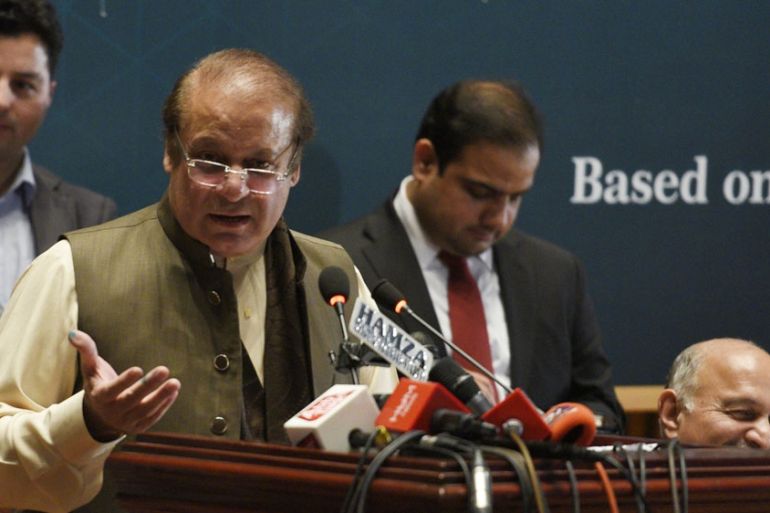Pakistan: Former PM accuses army of orchestrating dismissal
Sharif says corruption charges against him are a punishment for not dropping case against former army chief Musharraf.

Pakistan’s former Prime Minister Nawaz Sharif accused a former intelligence chief on Wednesday of asking him to “resign or go on a long leave” during opposition protests in 2014.
The three-time elected and unseated prime minister alleged in a statement that the 2014 demonstrations against his government were punishment for his refusal to drop a treason case against former army chief Pervez Musharraf.
Keep reading
list of 4 itemsSupporters of Pakistan ex-PM Khan’s party protest for fair election results
Pakistan’s real test begins after election, say analysts
‘Election engineering’: Is Pakistan’s February vote already rigged?
“Those days, a message was sent to me from the chief of an intelligence agency that I should resign, and if that is not possible, I should go on a long leave,” Sharif said, without identifying the individual.
“The demand for my resignation or going on long leave was based on this impression that if Nawaz Sharif was removed from the way, it wouldn’t be difficult to wrap up the case against Musharraf.”
Anti-corruption
Nawaz said demonstrations spearheaded by opposition figures Imran Khan and Muhammad Tahir-ul-Qadri in 2014 were engineered after the case against Musharraf was filed.
“Before the filing of the treason case, I had met Imran Khan and he never demanded my resignation. But surprisingly, after Musharraf was booked, he met Tahirul-ul-Qadri in London, where they decided to stage a sit-in against my government.”
Sharif was dismissed from office by the Supreme Court in July for an omission in a wealth declaration to parliament. The court also ordered the national anti-corruption watchdog to open several cases against him, three of his children, and several aides.
|
|
On September 15, the Supreme Court dismissed Sharif’s petitions seeking a review of that judgment and a halt to any anti-corruption proceedings.
The military did not immediately comment on the issue, but has consistently maintained it does not have any political role in running the country.
In March, army chief General Qamar Javed Bajwa told journalists the military was a neutral actor whose sole task was to defend the country and its institutions.
Musharraf came to power in 1999 in a bloodless coup against then-prime minister Sharif.
He stepped aside in 2008 and later faced a number of charges, including treason for suspending the constitution in 2007.
‘Stumbling block’
Also on Wednesday, Sharif suggested he was removed from office because of his foreign policy stances. His government clashed with the military over control of key issues, especially ties with regional rival India, the United States and Afghanistan.
“I was becoming a stumbling block in some matters,” he said.
“That’s why removing me from my office, removing from party, disqualifying for lifetime, and kicking from the political process was considered the only solution.”